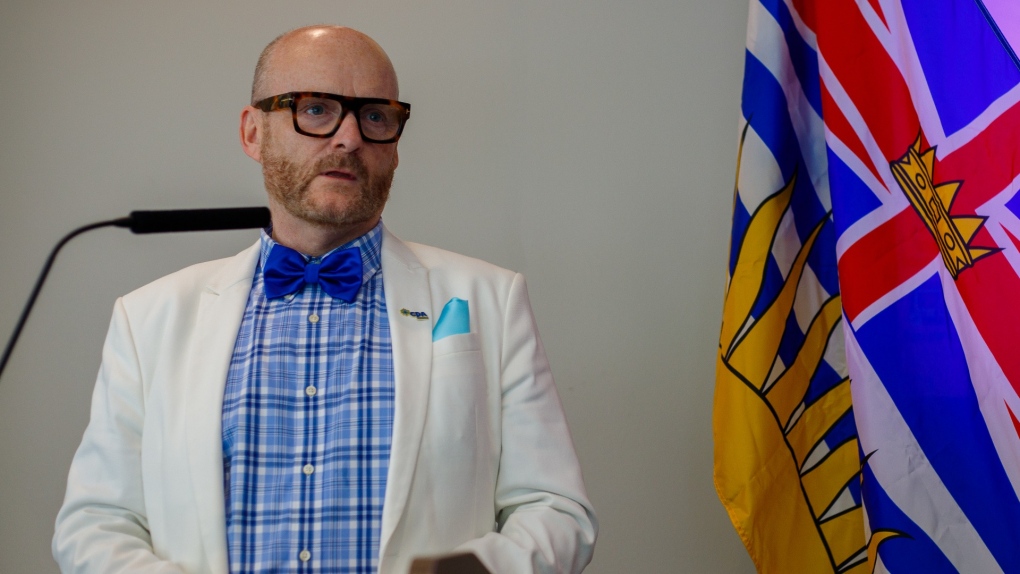B.C. financial statements don't follow 'generally accepted accounting principles,' auditor general says
 B.C. Auditor General Michael Pickup is seen in this image provided by his office.
B.C. Auditor General Michael Pickup is seen in this image provided by his office.
The province of British Columbia continues to ignore generally accepted accounting principles in its reporting of financial statements, according to Auditor General Michael Pickup.
For the third year in a row, Pickup is raising concerns about the provincial government's accounting practices, though one of the issues he raises in a statement Thursday dates back more than a decade.
The auditor general's comments come one day after B.C. released its audited public accounts for the 2022-23 fiscal year, which ended on March 31.
Finance Minister Katrine Conroy announced a $704-million surplus, but Pickup says that number would be several times higher if the province followed Canadian public sector accounting standards.
He identifies three ways in which the B.C. government deviates from those standards.
"These three errors – or what we would call 'qualifications' – are concerning," says Pickup in his statement.
"If this qualified audit report was delivered in the private sector, it could result in a significant loss of reputation, credit rating and share prices."
Pickup's statement describes the three qualifications in broad terms.
First, he writes that the way the government "accounts for funds received from other governments, and for externally restricted funds received from non-government sources," does not meet public sector accounting standards.
This leads the government to overstate its liabilities by $6.97 billion and understate its revenue and accumulated surplus by the same amount in the 2022-23 fiscal year. The province's accounting has included this error since the public sector accounting standard was created in 2012, according to Pickup.
Second, the provincial government's "contractual obligations to make certain future expenditures are not completely disclosed," another departure from accounting standards. This departure leads to an understatement of "disclosed contractual obligations" by about $4.9 billion in 2022-23.
Third, the government understates both revenues and expenses from gaming revenue sharing agreements with B.C. First Nations because of the way it treats those accounts. The 2022-23 financial statements are missing $113 million in both revenue and expense because of this treatment, Pickup says.
The auditor general describes these qualifications as "three significant errors that have not been corrected," noting in his statement that the province's Auditor General Act requires his office to report on whether the government's financial statements "are fairly stated in accordance with generally accepted accounting principles."
"Having a qualified opinion warns MLAs and other users of the financial statements that financial reporting may not be fully reliable," Pickup says. "Legislators need to consider the impact of the three qualifications we found, otherwise they may not get what they need from the summary financial statements."
B.C.'s financial statements cover more than $80 billion spent by a total of 160 government entities, including ministries, Crown corporations, post-secondary institutions, agencies and health organizations.
The auditor general says it takes more than 70 staff and contractors more than 60,000 hours to complete the office's audit of provincial financial statements each year.
CTVNews.ca Top Stories

Canadian team told Trump's tariffs unavoidable right now, but solutions on the table in surprise Mar-a-Lago meeting
During a surprise dinner at Mar-a-Lago, representatives of the federal government were told U.S. tariffs from the incoming Donald Trump administration cannot be avoided in the immediate term, two government sources tell CTV News.
Pedestrian killed by Via Rail train near Kingston, Ont.
Regular rail traffic has resumed with severe delays.
Muskoka reacts to major snowfall, hundreds stuck on Highway 11
From road closures, power outages, weather declarations and nonstop shovelling, Muskoka residents were faced with nearly a metre of persistent snowfall on Saturday.
Saskatoon priest accused of sexual assault says he meant to encourage young girl with hug and kiss
A Saskatoon priest accused of sexual assault says he meant to encourage and reassure a young girl when he hugged and kissed during his testimony at Saskatoon Provincial Court Friday.
Beef prices reach record highs in Canada
The cost of beef continues to rise, reaching record highs on grocery store shelves ahead of the busiest time for many grocers and butchers before the holiday season.
Trump threatens 100% tariff on the BRIC bloc of nations if they act to undermine U.S. dollar
U.S. president-elect Donald Trump on Saturday threatened 100 per cent tariffs against a bloc of nine nations if they act to undermine the U.S. dollar.
Bob Bryar, drummer for rock band My Chemical Romance, dead at 44
Bob Bryar, former drummer for the band My Chemical Romance, has died. He was reportedly 44.
Toronto man accused of posing as surgeon, giving four women injections
A 29-year-old Toronto man has been charged after allegedly posing as a surgeon and providing cosmetic procedures on several women.
'Disappointing': Toronto speed camera cut down less than 24 hours after being reinstalled
A Toronto speed camera notorious for issuing tens of thousands of tickets to drivers has been cut down again less than 24 hours after it was reinstalled.

































